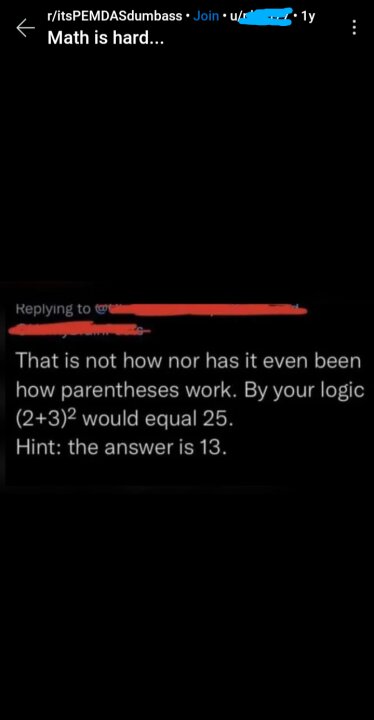It is NOT 13. 🤣
This page is a permanent link to the reply below and its nested replies. See all post replies »
ScarletWitch · 31-35, F
I thought 6 to the 6th power was 36. I can't remember tbh
xSiFiGamer2016x · 26-30, M
@ScarletWitch Want me to explain? I can help.
SomeMichGuy · M
xSiFiGamer2016x · 26-30, M
@SomeMichGuy Damn, I was gonna explain it. Oh well. 🤣
SomeMichGuy · M
@xSiFiGamer2016x Show the binomial theorem (how to generate the coefficients of Pascal's triangle)...relevant to the original problem.
xSiFiGamer2016x · 26-30, M
@SomeMichGuy As far as I can remember, this is what I was thinking:
(2+3)² = (2+3)(2+3)
Then did the F.O.I.L. method:
(2+3)(2+3) = 4+6+6+9 = 25
(2+3)² = (2+3)(2+3)
Then did the F.O.I.L. method:
(2+3)(2+3) = 4+6+6+9 = 25
SomeMichGuy · M
@xSiFiGamer2016x Yes
(a + b)^2 = a^2 + 2ab + b^2
(a + b)^3 = a^3 + 3a^2b + 3ab^2 + b^3
(a + b)^4 = a^4 + 4a^3b + 6a^2b^2 + 4ab^3 + b^4
...
If memory serves, the generalization is:
(a + b)^n = Σ_{j = 0}^{n} (n!/[j!(n-j)!]) a^{n-j}b^{j}
(the binomial theorem).
(a + b)^2 = a^2 + 2ab + b^2
(a + b)^3 = a^3 + 3a^2b + 3ab^2 + b^3
(a + b)^4 = a^4 + 4a^3b + 6a^2b^2 + 4ab^3 + b^4
...
If memory serves, the generalization is:
(a + b)^n = Σ_{j = 0}^{n} (n!/[j!(n-j)!]) a^{n-j}b^{j}
(the binomial theorem).
xSiFiGamer2016x · 26-30, M
@SomeMichGuy
I had to write that out, and I still got the answer right. It's been a while since I last used the formula, let alone other theorems.
(a + b)^2 = a^2 + 2ab + b^2
I had to write that out, and I still got the answer right. It's been a while since I last used the formula, let alone other theorems.
pawsly · 18-21, F
@SomeMichGuy how's that called generalization it doesn't generalize anything -_- I hate math
SomeMichGuy · M
@xSiFiGamer2016x Good job!
SomeMichGuy · M
@pawsly The binomial theorem gives one the ability to calculate
(a + b)^n
for any n, as a series of n + 1 terms.
So it generalizes the specific examples to any n.
Or you can write out Pascal's triangle...do it to n = 20...lmao.
The formula is obviously a generalization, and makes having a bunch of specific examples unnecessary.
(a + b)^n
for any n, as a series of n + 1 terms.
So it generalizes the specific examples to any n.
Or you can write out Pascal's triangle...do it to n = 20...lmao.
The formula is obviously a generalization, and makes having a bunch of specific examples unnecessary.









